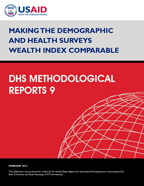- PUBLICATIONS
- JOURNAL ARTICLES
- ACCESS PUBLICATIONS
Publications Summary
- Document Type
- Methodological Reports
- Publication Topic(s)
- Wealth/Socioeconomics
- Language
- English
- Recommended Citation
- Rutstein, Shea O., and Sarah Staveteig. 2014. Making the Demographic and Health Surveys Wealth Index Comparable. DHS Methodological Reports No. 9. Rockville, Maryland, USA: ICF International.
- Download Citation
- RIS format / Text format / Endnote format
- Publication Date
- February 2014
- Publication ID
- MR9
Download
 Making the Demographic and Health Surveys Wealth Index Comparable (PDF, 725K)
Making the Demographic and Health Surveys Wealth Index Comparable (PDF, 725K)
